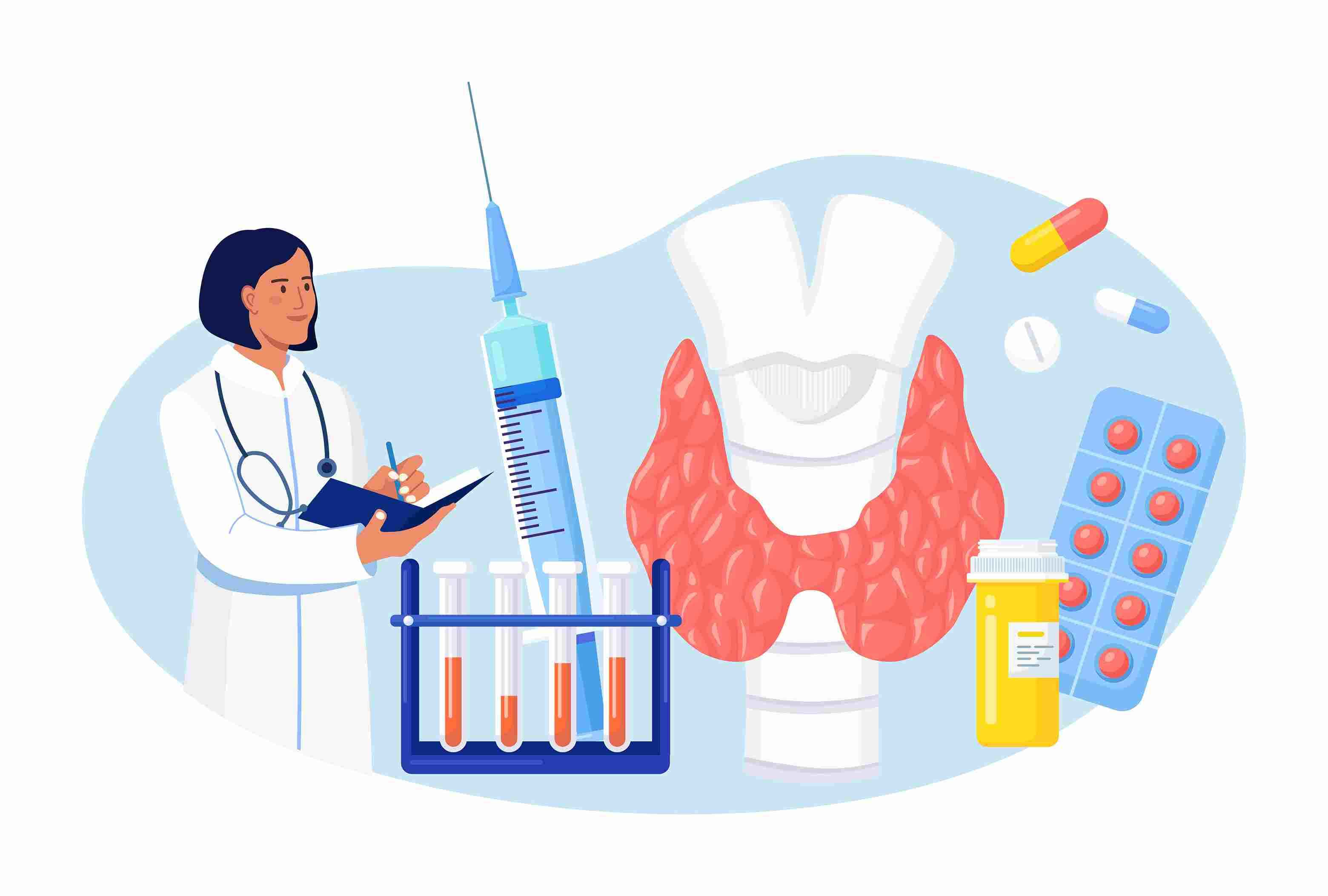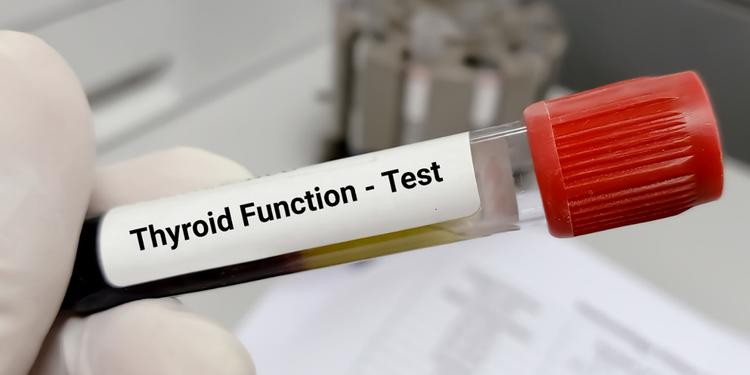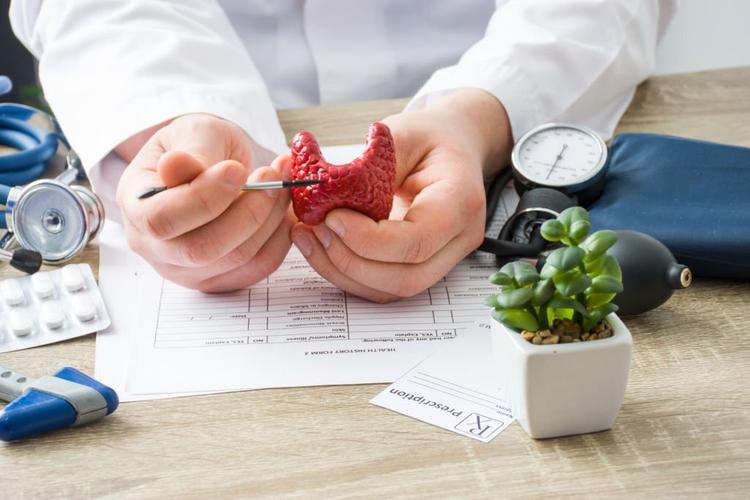Blood Tests for Thyroid to Identify Thyroid Problems

Medically Reviewed By
Dr Divya Rohra
Written By Kirti Saxena
on Aug 14, 2023
Last Edit Made By Kirti Saxena
on Jan 9, 2025

In India, nearly 42 million people have thyroid-related diseases. Women are at high risk of thyroid diseases as compared to men due to its autoimmune nature. Another reason is an interrelation between thyroid hormones and hormones (LH, FSH, estrogen, and progesterone) that fluctuate during the menstrual cycle. The most common thyroid effect in women is hypothyroidism.
People suffering from thyroid disease commonly experience fatigue, hair thinning, weight changes, and menstrual cycle changes. Imbalancing of the thyroid has various causes, such as iodine deficiency, genetic disorders, or certain medications.
If you're feeling tired and gaining weight, you must not avoid these symptoms. Your doctor will advise you to take Thyroid Profile Test, TSH 3rd Generation Test, Thyroid Screening Panel, etc. It's important to know the symptoms and get treated timely to reduce the effect on overall health and well-being.
Let’s understand the thyroid causes, symptoms, risks, and more in detail. Let’s begin.
Is the Thyroid an Important Organ?
Thyroid glands regulate the body's metabolism, energy production, heart rate, body temperature, and growth.
It produces two primary hormones:
- triiodothyronine (T3)
- thyroxine (T4)
These hormones are released into the bloodstream and affect the functioning of almost every organ in the body. The pituitary gland controls the production and release of thyroid hormones at the brain's base. The pituitary gland produces thyroid-stimulating hormone (TSH), which signals the thyroid gland to produce and release T3 and T4.
Thyroid hormones control your-
- Body temperature and blood circulation
- Appetite
- Energy levels
- Heart rate
- Blood sugar level
- Growth and bone development
- Cholesterol levels
- Fat, carbohydrates, and protein metabolism
Symptoms of Abnormal Thyroid in Females
The thyroid gland produces too much or little hormones when thyroid disorder catches you.
Hypothyroidism is when the thyroid gland is underactive and does not produce enough hormones, leading to a slowdown in bodily functions. Conversely, hyperthyroidism is when the thyroid gland is overactive and produces excess hormones, increasing bodily functions.
Symptoms of abnormal thyroid function in females depend on whether the thyroid is underactive (hypothyroidism) or overactive (hyperthyroidism).
Underactive thyroid symptoms in females:
- Fatigue and lethargy: Feeling constantly tired, lacking energy, and experiencing overall sluggishness.
- Weight gain: Unexpected weight gain or difficulty losing weight despite efforts.
- Cold intolerance: Feeling unusually cold, even in normal environments.
- Dry skin and hair: Dry, rough skin and brittle hair that may also become thin and brittle.
- Mood swings and depression: Mood changes, irritability, sadness, and depression.
- Muscle weakness and joint pain: Muscle weakness, frequent muscle aches, and joint pain.
- Irregular menstrual cycles: Changes in the menstrual cycle, including heavier or more prolonged periods or irregular periods.
Symptoms of Hyperthyroidism in Females:
- Sudden weight loss or increased appetite: Significant weight loss without intentional effort or an increased appetite.
- Increased heartbeat: Palpitations, increased heart rate, or an irregular heart rhythm.
- Heat intolerance and excessive sweating: Feeling hot or sweating excessively, even in cooler temperatures.
- Anxiety, irritability, and nervousness: Restlessness, irritability, anxiety, and feeling easily agitated.
- Tremors and muscle weakness: Shaking hands, trembling, and muscle weakness.
- Changes in menstrual patterns: Irregular periods, lighter or shorter menstrual flow, or even cessation of periods.
- Sleep disturbances: Trouble falling asleep, insomnia, or disrupted sleep patterns.
These thyroid symptoms may vary from person to person, and some may experience a combination of symptoms. If you suspect you have thyroid-related symptoms, it's recommended to consult a healthcare professional for an accurate diagnosis and appropriate treatment. Consider getting a thyroid panel test from Redcliffe Labs if you feel hyperthyroidism or hypothyroidism symptoms.

What Causes Thyroid in Females?
The thyroid is a small butterfly-shaped gland in the front of the neck, just below the Adam's apple. It is part of the endocrine system, producing and regulating hormones. Thyroid disease may be caused for diverse reasons depending on the type of thyroid disorder. Here are some common causes of thyroid:
Hypothyroidism causes due to:
- Autoimmune thyroiditis (Hashimoto's thyroiditis) is when the body's immune system mistakenly attacks and damages the thyroid gland.
- Removal of the surgical thyroid gland due to thyroid cancer or other health concerns.
- Exposure to radiation therapy affects the ability to produce hormones.
- Some infants are born with an underactive thyroid gland due to genetic disorders or abnormal fetal development.
- Iodine deficiency is one of the major causes that affect the production of thyroid hormones in millions of people.
Hyperthyroidism causes due to:
- Graves' disease is an autoimmune disorder when the immune system mistakenly stimulates the thyroid gland to produce excess thyroid hormones.
- Toxic multinodular goiter is the development of multiple nodules in the thyroid gland.
- Excessive iodine intake, whether through a rough diet or medication, may lead to excessive release of thyroid hormones.
- Pituitary gland dysfunctioning can disrupt the normal regulation of thyroid hormone production.
Blood Tests for Thyroid
Doctors may advise one or more blood tests for thyroid based on the symptoms to check the thyroid functioning. The test may include the thyroid stimulating hormone TSH, T3, T4, and thyroid antibody tests.
- Thyroid profile test: This test diagnoses the TSH level, including Triiodothyronine (T3), Thyroxine (T4), and Thyroid Stimulating Hormone (TSH), to know which thyroid you have hypothyroidism or hyperthyroidism.
- TSH 3rd generation test: This blood test for thyroid measures if the TSH level is ultra-sensitive or Hypersensitive.
- Anti Thyroid Peroxidase Antibodies (TPO) Test: This test checks the TPO antibodies & other thyroid disorders risks.
- Thyroid Profile Extensive: This test measures the amount of TSH level in blood along with the functioning of the thyroid gland. The test also helps to diagnose hyperthyroidism or hypothyroidism.
- Thyroid Antibodies Panel (Anti TPO, Anti TG) Test: This thyroid blood test diagnoses the percentage of antithyroid thyroglobulin and antithyroid peroxidase antibodies.
Risk Factors for Thyroid
Women are at higher risk of thyroid diseases than men. However, the risk of developing thyroid diseases increases with age. There are several causes of thyroid in females that increase the chances like:
- Pregnancy or Postpartum
- Autoimmune disease
- family history of thyroid
- excessive or limited iodine consumption
- Being female
- Certain medications
- Psychological Stress
- Autoimmune diseases
These risk factors can be avoided with regular check-ups, self-awareness of symptoms, and consultation with a healthcare professional.
How to Prevent Thyroid Problems?
While it's not always possible to prevent thyroid problems entirely, there are certain steps you can take to maintain your thyroid health and reduce the risk of developing thyroid disease.
- Balanced diet: Maintain a nutritious diet that includes a variety of fruits, vegetables, whole grains, lean proteins, and healthy fats.
- Iodine intake: Ensure a sufficient but not excessive intake of iodine. Iodized salt, seafood, dairy products, and eggs are good sources of iodine.
- Regular exercise: Engage in regular physical activity to support overall well-being.
- Stress management: Practice stress-reducing techniques such as relaxation exercises, meditation, and yoga.
- Avoid smoking: Smoking increases the risk of thyroid disorders. However, quitting smoking is beneficial for the thyroid and overall well-being.
- Regular health check-ups: Schedule routine check-ups with your healthcare provider. Book an appointment with Redcliffe Labs today and take a blood test for thyroid- Thyroid Profile test to detect the functioning of the thyroid right from your home. The thyroid test price is affordable here, and you will be tested in an advanced laboratory.
However, if you have a pre-existing thyroid condition or are at high risk due to family history or other factors, get help from your healthcare provider to monitor and manage your thyroid. Take prescribed medications as directed and attend regular follow-up appointments. Get diagnosed with Redcliffe labs to monitor and manage your thyroid health, especially if you are a woman.


